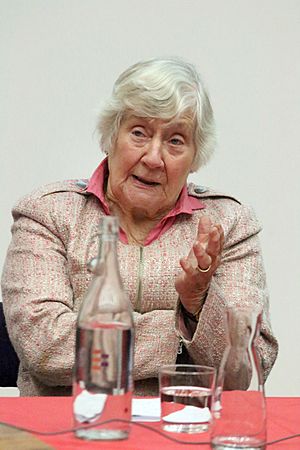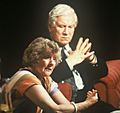Shirley Williams facts for kids
Quick facts for kids
The Baroness Williams of Crosby
|
|||||||||||||||||||||||||||||||||||
|---|---|---|---|---|---|---|---|---|---|---|---|---|---|---|---|---|---|---|---|---|---|---|---|---|---|---|---|---|---|---|---|---|---|---|---|

Williams in 2014
|
|||||||||||||||||||||||||||||||||||
| Leader of the Liberal Democrats in the House of Lords | |||||||||||||||||||||||||||||||||||
| In office 7 June 2001 – 24 November 2004 |
|||||||||||||||||||||||||||||||||||
| Leader | Charles Kennedy | ||||||||||||||||||||||||||||||||||
| Preceded by | The Lord Rodgers of Quarry Bank | ||||||||||||||||||||||||||||||||||
| Succeeded by | The Lord McNally | ||||||||||||||||||||||||||||||||||
| President of the Social Democratic Party | |||||||||||||||||||||||||||||||||||
| In office 7 July 1982 – 29 August 1987 |
|||||||||||||||||||||||||||||||||||
| Leader | |||||||||||||||||||||||||||||||||||
| Preceded by | Office established | ||||||||||||||||||||||||||||||||||
| Succeeded by | John Cartwright | ||||||||||||||||||||||||||||||||||
| Secretary of State for Education and Science | |||||||||||||||||||||||||||||||||||
| In office 10 September 1976 – 4 May 1979 |
|||||||||||||||||||||||||||||||||||
| Prime Minister | James Callaghan | ||||||||||||||||||||||||||||||||||
| Preceded by | Fred Mulley | ||||||||||||||||||||||||||||||||||
| Succeeded by | Mark Carlisle | ||||||||||||||||||||||||||||||||||
| Paymaster General | |||||||||||||||||||||||||||||||||||
| In office 10 September 1976 – 4 May 1979 |
|||||||||||||||||||||||||||||||||||
| Prime Minister | James Callaghan | ||||||||||||||||||||||||||||||||||
| Preceded by | Edmund Dell | ||||||||||||||||||||||||||||||||||
| Succeeded by | Angus Maude | ||||||||||||||||||||||||||||||||||
| Secretary of State for Prices and Consumer Protection | |||||||||||||||||||||||||||||||||||
| In office 5 March 1974 – 10 September 1976 |
|||||||||||||||||||||||||||||||||||
| Prime Minister |
|
||||||||||||||||||||||||||||||||||
| Preceded by | Peter Walker (as Trade and Industry Secretary) | ||||||||||||||||||||||||||||||||||
| Succeeded by | Roy Hattersley | ||||||||||||||||||||||||||||||||||
|
|||||||||||||||||||||||||||||||||||
|
|||||||||||||||||||||||||||||||||||
|
|||||||||||||||||||||||||||||||||||
| Personal details | |||||||||||||||||||||||||||||||||||
| Born |
Shirley Vivian Teresa Brittain Catlin
27 July 1930 Chelsea, London, England |
||||||||||||||||||||||||||||||||||
| Died | 12 April 2021 (aged 90) Little Hadham, England |
||||||||||||||||||||||||||||||||||
| Political party |
|
||||||||||||||||||||||||||||||||||
| Spouses | |||||||||||||||||||||||||||||||||||
| Children | 1 | ||||||||||||||||||||||||||||||||||
| Parents |
|
||||||||||||||||||||||||||||||||||
| Alma mater | |||||||||||||||||||||||||||||||||||
| Scientific career | |||||||||||||||||||||||||||||||||||
| Institutions | Harvard Kennedy School | ||||||||||||||||||||||||||||||||||
Shirley Williams (born Shirley Vivian Teresa Brittain Catlin; 27 July 1930 – 12 April 2021) was a very important British politician and teacher. She was known for being a Member of Parliament (MP) for many years. She started in the Labour Party and was a government minister from 1974 to 1979.
Later, in 1981, she was one of four politicians who started a new party called the Social Democratic Party (SDP). She then joined the Liberal Democrats party. She was also a professor at Harvard Kennedy School in the United States.
Shirley Williams was elected to the House of Commons in 1964 for Hitchin. She held several important jobs in government. These included Minister for Education and Science and Minister of State for Home Affairs. She also served as Shadow Home Secretary when her party was not in power.
In 1974, she became the Secretary of State for Prices and Consumer Protection. This role involved looking after prices and making sure consumers were treated fairly. Later, she became Secretary of State for Education and Science and Paymaster General at the same time. She lost her seat in Parliament in the 1979 election.
In 1981, she helped create the SDP because she disagreed with the Labour Party's direction. She won a special election in Crosby and became the first SDP member in Parliament. She was President of the SDP from 1982 to 1987. She supported the SDP joining with the Liberal Party to form the Liberal Democrats.
From 2001 to 2004, she led the Liberal Democrats in the House of Lords. She also advised Prime Minister Gordon Brown on nuclear weapons. She retired from the House of Lords in 2016. Shirley Williams was a professor at Harvard University until she passed away at age 90.
Contents
Shirley Williams's Early Life and Education
Shirley Williams was born in London on 27 July 1930. Her father, Sir George Catlin, was a political scientist. Her mother, Vera Brittain, was a writer who believed in peace. Shirley went to several schools in London.
During World War II, from 1940 to 1943, she moved to the United States. She attended Summit School, an all-girls' school in Minnesota. While in the US, she even tried out for a movie role in National Velvet. However, the part went to Elizabeth Taylor.
University Studies and Early Career
Shirley Williams went to Somerville College, Oxford University. She studied philosophy, politics, and economics. She was also part of the Oxford University Dramatic Society. She even toured the US playing a role in Shakespeare's King Lear.
After Oxford, she received a scholarship to study at Columbia University in New York City. She learned about trade unions in America. When she returned to Britain, she started working as a journalist. She wrote for the Daily Mirror and the Financial Times. From 1960 to 1964, she was the General Secretary of the Fabian Society. This group works to advance socialist ideas.
Shirley Williams's Time in Parliament
Shirley Williams tried to become a Member of Parliament (MP) several times. She finally won the election in 1964. She became the Labour MP for Hitchin in Hertfordshire. She kept this seat, which was later renamed Hertford and Stevenage, until 1979.
As Minister for Education and Science, she started the first Women in Engineering Year in 1969. This encouraged more women to join engineering. Her colleagues remembered her as someone who genuinely liked people. She would always talk to everyone, not just important political figures.
Key Government Roles
From 1971 to 1973, she was the Shadow Home Secretary. This meant she was the main opposition spokesperson for home affairs. In 1974, she joined Harold Wilson's government as Secretary of State for Prices and Consumer Protection. This job involved controlling prices and protecting shoppers.
When James Callaghan became Prime Minister in 1976, Shirley Williams took on two big jobs. She became Secretary of State for Education and Paymaster General. She held both these important positions at the same time.
Comprehensive Schools and Education Policy
As Education Secretary (1976-1979), Shirley Williams continued a policy to change schools. This policy aimed to replace grammar schools with comprehensive schools. Comprehensive schools are open to all students, regardless of their academic ability.
This was a big change in the education system. It aimed to make education fairer for everyone.
Supporting European Unity
Shirley Williams strongly believed in European integration. She thought Britain should be closely linked with other European countries. In 1971, she was one of 68 Labour MPs who voted for Britain to join the European Communities. This was against her party's official stance at the time.
She also played a leading role in the campaign for Britain to stay in Europe during the 1975 referendum. Her strong belief in Europe was one reason she left the Labour Party in 1981. She felt the party was becoming too anti-European.
In 2016, she gave a farewell speech in the House of Lords. She said that Britain's membership in the European Union (EU) was the most important political question for the country. She urged her colleagues to think carefully before leaving the EU.
Forming the Social Democratic Party
Shirley Williams lost her seat in Parliament in the 1979 general election. After this, she hosted a TV show where she interviewed political figures. She also appeared on many TV and radio discussion programs. She was a very frequent guest on the BBC's Question Time.
In 1981, she was unhappy with the Labour Party. She felt it was moving too far to the left. So, she resigned from the party. She joined with three other Labour politicians: Roy Jenkins, David Owen, and Bill Rodgers. They were known as the "Gang of Four". Together, they formed a new party called the Social Democratic Party (SDP).
Later that year, Shirley Williams won a special election in Crosby. This made her the first SDP member to be elected to Parliament. She became the SDP's President. However, she lost her seat in the 1983 general election. She continued to support the SDP. She also supported the SDP joining with the Liberal Party to form the Liberal Democrats party.
Life as a Peer and Advisor
In 1988, Shirley Williams moved to the United States. She became a professor at Harvard Kennedy School. She taught there until 2001. Even while in the US, she stayed involved in politics and public service. She helped write new constitutions for countries like Russia, Ukraine, and South Africa.
She also directed a project at Harvard called Project Liberty. This project helped new democracies in Central and Eastern Europe. In 1993, she was made a life peer. This meant she became a member of the House of Lords for life. She was known as Baroness Williams of Crosby.
From 2001 to 2004, she led the Liberal Democrats in the House of Lords. She was also a member of many important groups. These groups focused on international relations and global issues. In 2007, she became an advisor to Prime Minister Gordon Brown. She advised him on how to stop the spread of nuclear weapons.
Shirley Williams continued to be interested in education. She was the Chair of Judges for the British Teaching Awards. She also spoke about important issues in the House of Lords. She retired from the House of Lords in 2016. In 2017, she received a special honour called the Order of the Companions of Honour for her public service.
Shirley Williams's Personal Life
Shirley Williams was married twice. In 1955, she married Bernard Williams, a philosopher. They had one daughter named Rebecca, who became a lawyer. Their marriage ended in 1974. In 1987, she married Richard Neustadt, a Harvard professor. He passed away in 2003.
She lived in Hertfordshire for many years. Shirley Williams was a Roman Catholic. She enjoyed music, poetry, and walking in the hills.
Shirley Williams passed away at her home on 12 April 2021, at the age of 90. Many people in politics remembered her as a strong and wise leader.
Honours and Recognition
Shirley Williams received many honours during her life. She was made an Honorary Fellow at her old college, Somerville College, Oxford, in 1970. She also received many honorary doctorates from different universities. These awards recognized her contributions to education, politics, and public life.
Books by Shirley Williams
Shirley Williams wrote several books about her life and politics:
- Climbing the Bookshelves: The Autobiography of Shirley Williams (2009)
- God and Caesar: Personal Reflections on Politics and Religion (2003)
- Politics is for People (1981)
Images for kids
 | Bayard Rustin |
 | Jeannette Carter |
 | Jeremiah A. Brown |


